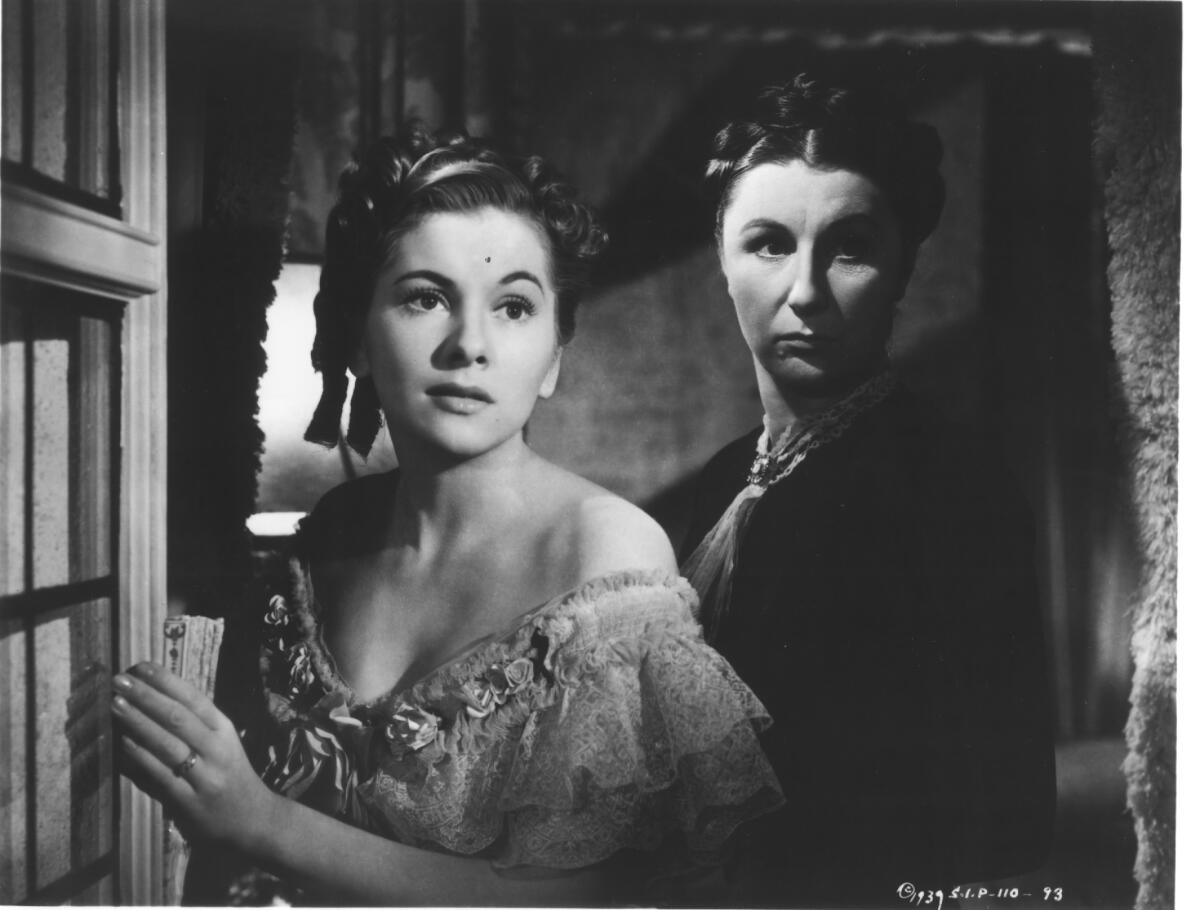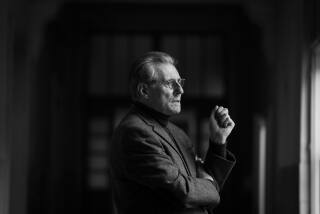From the Archives: Mood magic of ’Rebecca’ re-created

- Share via
“Manderley was the most beautiful house I ever saw — a thing of grace, exquisite and faultless. Its clean gray stone had been mellowed by the centuries. Time could not harm the perfect symmetry of those walls. Its shining mullioned windows looked down upon bright gardens and trim velvet lawns which swept in terrace after terrace to the sea ...
“We can never go back there again. The past is still too close to us. But sometimes in my dreams I do go back ... to the strange days of my life, which began, for me, on the top of a cliff in the south of France —”
WEAVES SLOW SPELL
It was there, on the top of a cliff in the south of France, that the nameless heroine of Daphne du Maurier’s novel, “Rebecca,” met Maxim de Winter. And it is there, after speaking the words above, that Joan Fontaine meets Laurence Olivier in the film version of the novel now at the Four-Star Theater.
Like “Wuthering Heights,” written by another woman and presenting this same Olivier a year ago, “Rebecca” is a masterpiece of mood. David O. Selznick has given it the kind of production you’d expect — ”exquisite and faultless” — and in it England’s Alfred Hitchcock has directed a cast that is astonishingly right. I doubt, indeed, that there has ever been such fidelity to an author’s concept, even in Mr. Selznick’s “Gone With the Wind.” If I add, parenthetically, that it is more faithful than this particular author seems to one reader to deserve, it is still the opinion of only one reader.
CHANGES TECHNIQUE
Hitchcock has altered his style — that of “The 39 Steps” and other superb tragicomic melodramas — to conform to the subject, so that the work appears to be compounded equally of du Maurier, Hitchcock — and Selznick. In this sense it both gains and (to the admirers of simonpure Hitchcock) loses. The gain is in the casting, in fuller richer dialogue, in a certain dignity. The loss, less easy to define, is perhaps in erratic brilliance and filmic surprise. Yet neither is really absent; and the Hitchcock suspense, to coin a phrase, is terrific.
The suspense is sustained, remarkably, for more than two hours. Dominating all, always, is the spirit of Rebecca, a woman dead before the narrative begins. To her, for the most infamous performance, off screen or on, in history, 1940’s Academy Award.
NOTABLE FIGURE
Miss Fontaine has played the heroine with the exact beaten quality of the girl in the book. She must have; I wanted to slap them both! No reflection, this, on her interpretation, for any other would have defeated the whole plan of the film — which unfolds events through her eyes. Miss Fontaine is a talented actress.
Like Ronald Colman, whom he resembles, Olivier is adept at throwing away lines, if sometimes a bit hard to understand. His tragic Maxim must rank with his tragic Heathcllff.
Three women — Judith Anderson as Mrs. Danvers, Florence Bates as the vulgar Mrs. Van Hopper, and Gladys Cooper as Beatrice — augment an extraordinary gallery of types, and George Sanders portrays his most malignant heavy, Jack Favell. You want to step on him.
The others, flawless, are Reginald Denny, Nigel Bruce, Leonard Carey, Leo G. Carroll, Lumsden Hare, Melville Cooper, Edward Fielding.
Robert E. Sherwood and Joan Harrison wrote the screen play from the adaptation by Philip MacDonald and Michael Hogan. George Barnes was the cinematographer. The score is Franz Waxman’s.
Judging by the eager throngs yesterday afternoon, “Rebecca” is the season’s matinee attraction. It will haunt you at night too.
More to Read
Only good movies
Get the Indie Focus newsletter, Mark Olsen's weekly guide to the world of cinema.
You may occasionally receive promotional content from the Los Angeles Times.










